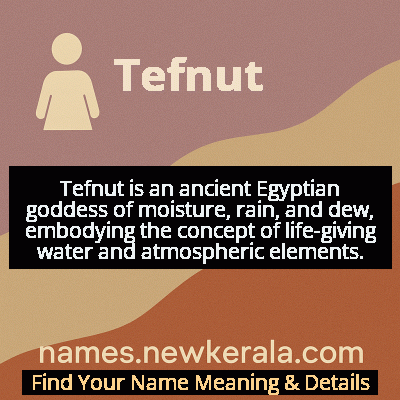Tefnut Name Meaning & Details
Origin, Popularity, Numerology Analysis & Name Meaning of Tefnut
Discover the origin, meaning, and cultural significance of the name TEFNUT. Delve into its historical roots and explore the lasting impact it has had on communities and traditions.
Name
Tefnut
Gender
Female
Origin
Egyptian
Lucky Number
5
Meaning of the Name - Tefnut
Tefnut is an ancient Egyptian goddess of moisture, rain, and dew, embodying the concept of life-giving water and atmospheric elements.
Tefnut - Complete Numerology Analysis
Your Numerology Number
Based on Pythagorean Numerology System
Ruling Planet
Mercury
Positive Nature
Adventurous, dynamic, curious, and social.
Negative Traits
Restless, impatient, inconsistent, prone to indulgence.
Lucky Colours
Green, white.
Lucky Days
Wednesday.
Lucky Stones
Emerald.
Harmony Numbers
1, 3, 9.
Best Suited Professions
Sales, marketing, travel, entertainment.
What People Like About You
Versatility, charisma, adventurous spirit.
Famous People Named Tefnut
Tefnut (Mythological)
Egyptian Goddess
Primordial deity of moisture, created by Atum, mother of Geb and Nut
Tefnut Priestess
Religious Leader
High priestess serving in temples dedicated to Tefnut and Shu
Tefnut Merit
Noblewoman
Royal court official known for commissioning religious texts about Tefnut
Name Variations & International Equivalents
Click on blue names to explore their detailed meanings. Gray names with will be available soon.
Cultural & Historical Significance
As sister-wife to Shu (air) and mother of Geb (earth) and Nut (sky), Tefnut represented one of the fundamental building blocks of the ordered universe. Her lioness form connected her to both protective and destructive aspects of nature, reflecting the Egyptian understanding of deities as complex beings with multiple facets. Worship of Tefnut was particularly prominent in Heliopolis, where she was venerated alongside her brother-husband Shu. Her cult emphasized the interdependence of natural elements and the delicate balance required to maintain cosmic order (ma'at), making her not just a weather deity but a fundamental principle in Egyptian understanding of how the world functioned.
Extended Personality Analysis
Those named Tefnut are often characterized by their emotional depth and intuitive understanding of natural cycles. They tend to be highly sensitive to their environment and the emotions of others, much like the moisture Tefnut governs responds to atmospheric conditions. This sensitivity makes them excellent caregivers and nurturers, though it can also lead to emotional volatility when they feel overwhelmed. Their personality typically combines gentle compassion with a fierce protective instinct - they can be as gentle as morning dew or as powerful as a storm, depending on circumstances.
The mythological Tefnut's journey of anger, withdrawal, and eventual return translates psychologically to individuals who may experience intense emotional cycles but possess strong capacities for reconciliation and forgiveness. They often demonstrate remarkable resilience and adaptability, able to transform challenging situations much like water changes form. Their dual nature means they can be both deeply empathetic and formidably strong-willed, making them complex individuals who value authenticity and emotional honesty in relationships. They typically thrive in environments where they can both nurture and be respected for their strength and boundaries.
Modern Usage & Popularity
In contemporary naming practices, Tefnut remains an exceptionally rare choice, primarily confined to academic circles, mythology enthusiasts, and families with specific interest in ancient Egyptian culture. The name has never appeared in the Social Security Administration's baby name database in the United States, and similar patterns exist in other English-speaking countries. However, there's been a modest increase in usage among neo-pagan communities and parents seeking unique mythological names with strong female associations. The name's complexity and unfamiliar pronunciation to most English speakers limit its widespread adoption, but it enjoys niche popularity among those appreciating its deep historical roots and environmental symbolism. Recent trends toward diverse cultural names and renewed interest in mythology suggest Tefnut may see gradual increased usage, particularly as parents seek names that combine feminine power with ecological consciousness.
Symbolic & Spiritual Meanings
Tefnut embodies profound symbolic meanings that extend beyond her literal association with moisture. She represents the essential paradox of water - both life-giving and potentially destructive, gentle yet powerful. As the deity who voluntarily left Egypt only to be persuaded to return, she symbolizes the necessary cycles of separation and reunion that characterize healthy relationships and personal growth. Her transformation from angry exile to reconciled goddess mirrors psychological processes of anger processing, boundary-setting, and eventual reconciliation.
Metaphorically, Tefnut represents emotional intelligence and intuition - the ability to sense subtle changes in emotional atmospheres much as she governed atmospheric moisture. Her connection to both creation myths and maintenance of cosmic order positions her as a symbol of sustainability and ecological balance. In modern symbolic interpretation, Tefnut can represent the importance of emotional expression and the recognition that all emotions, even challenging ones like anger, have their place in personal and relational ecosystems. Her lioness aspect adds layers of feminine power, protection, and the integration of seemingly contradictory qualities within a unified whole.

